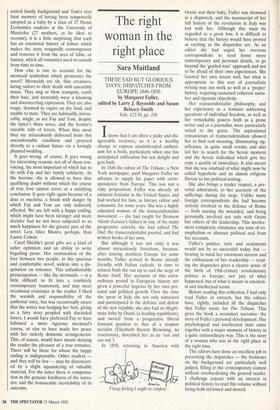The right woman in the right place
Sara Maitland
THESE SAD BUT GLORIOUS DAYS: DISPATCHES FROM EUROPE 1846-1850 by Margaret Fuller, edited by Larry J. Reynolds and Susan Belasco Smith Yale, £22.50, pp. 338 Iknow that I am often a picky and dis- agreeable reviewer, so it is a healthy change to express unadulterated enthusi- asm for a book, particularly when one has anticipated edification but not delight and gets both.
In 1846 the editor of The Tribune, a New York newspaper, paid Margaret Fuller an advance to supply his paper with corre- spondence from Europe. This was not a risky proposition: Fuller was already an eminent feminist in the United States, and had worked for him, as literary editor and columnist, for some years. She was a highly educated woman of the transcendentalist movement — she had taught for Bronson Alcott (Louisa's father) in one of his many progressive schools; she had edited The Dial, the transcendentalist journal, and had written books of her own.
But although it was not risky it was almost miraculously fortuitous, because, after touring northern Europe for some months, Fuller arrived in Rome already friendly with Italian radicals, in time to witness both the run up to and the siege of Rome itself. Her accounts of this extra- ordinary period in European history are given a powerful impetus by her own per- sonal and political growth. Over the time she spent in Italy she not only witnessed and participated in the defence and defeat of the new republic, she also had an illegiti- mate baby by Ossini (a leading republican), and moved from a progressive liberal feminist position to that of a utopian socialist (Elizabeth Barrett Browning, no reactionary, described her as an 'out and out red.')
In 1850, returning to America with
'1 keep feeling I ought to confess.'
Ossini and their baby, Fuller was drowned in a shipwreck, and the manuscript of her full history of the revolution in Italy was lost with her. Although this must be regarded as a great loss, it is difficult to believe that the history would have proved as exciting as the dispatches are. As an editor she had urged her overseas correspondents to send home more contemporary and personal details, to go beyond the 'guided tour' approach and not to be afraid of their own experiences. She learned her own lesson well, but what is appropriate to this sort of journalistic writing may not work so well in a 'proper' history, requiring sustained coherent narra- tive and rigorous objectivity.
Her transcendentalist philosophy, and her experience as a feminist addressing questions of individual freedom, as well as her remarkable powers both as a prose writer and as a journalist, were particularly suited to the genre. The aspirational romanticism of transcendentalism allowed her to find real meaning, illuminating sig- nificance, in quite small events; and also led her to search for the heroic moment and the heroic individual which give her copy a quality of immediacy. It also meant that she was unafraid of what might now be called hyperbole and an almost religious flavour to her political writing.
She also brings a tender respect, a per- sonal admiration, to her accounts of the sufferings during the siege. Unlike many foreign correspondents she had become actively involved in the defence of Rome — both nursing the wounded, and being personally involved not only with Ossini but others of the leadership. This involve- ment completely eliminates any tone of tri- umphalism or abstract political zeal from her accounts.
Fuller's politics, style and sentiments would not be so successful today, but bearing in mind her enormous success and the enthusiasm of her readership — read- ing the dispatches gives a clearer sense of the birth of 19th-century revolutionary politics in Europe; not just of what happened, but of what it meant in emotion- al and intellectual terms.
Before reading this collection, I had only read Fuller in extracts, but the editors
have, rightly, included all the dispatches that Fuller wrote for The Tribune. This gives the book a secondary narrative: the story of Fuller's personal development. Her
psychological and intellectual state came together with a major moment of history in a quite extraordinary way. This is the story of a woman who was in the right place at the right time.
The editors have done an excellent job in presenting the dispatches — the footnotes on the background are particularly well judged, filling in the contemporary context without overburdening the general reader.
I challenge anyone with an interest in political history to read this volume without being both informed and moved.


























































 Previous page
Previous page